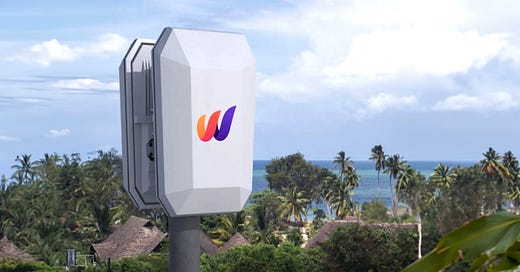Sunsetting the Cabal, Onboarding DePIN
How to get paid for sending your cell service provider to zero
The material use case era of blockchain is here and things may never be the same! But I can sense your eyeballs glazing over when I start talking about decentralized physical infrastructure networks (DePIN).
The name, “DePIN”, sounds complicated and like there would be domain-specific skills required to participate. Nope. This must be what it was like for early proponents of home computers. “This is going to change everything!” met with, “My typewriter works just fine, pal.”
Centralized infrastructure currently has the upper hand solely by way of inertia. This soon will change because in every way, decentralized infrastructure is far better. I will explain.
As a stock example of legacy centralized infrastructure consider telecoms companies. There is a centralized entity (AT&T, Verizon, Telus, Rogers, etc.) controlling the network of cellular towers, devices and users. Here in Canada, these entities are very few and particularly deplorable. They mark up their mediocre service - if you can even call it that - at exorbitant rates and frequently “accidentally” over-charge. It takes precious little time to infer that the reason this value to price imbalance exists is because their main incentive is to drive shareholder value, not create the best product or service. This is the most fatal flaw of centralized networks; they are far too easily corrupted by profit prioritizing incentives. Typically masked in whatever ideological framework is trending, whatever makes the most money for stakeholders is what centralized entities will do, every. single. time.
Now consider World Mobile, a Decentralized infrastructure network. Literally anyone can buy an AirNode - which is essentially a small cell tower - and set it up at their home or business. This small operator would support the scale and security of the network, and they would be rewarded for providing “proof of coverage”. This proof is verified and logged on chain, making it resistant to tampering. Costs to a user of this network would be drastically lower as there is no bloated legacy corp involved, devouring its own value creation. The operators and users of the network both have a mutual and vested interest in the network’s success, so value is distributed equally among all participants - Game changing - It’s the kind of thing that would make God say, “See, this is what I love about these guys”.
There are many other, far more technical reasons that decentralized or distributed networks have the edge, but I’ll spare the jargon as the thesis is quite clear; DePIN are simply better because operators and users are aligned. And since virtue-signalling for profit is not an embedded incentive, they can be truly equitable.
The antithesis is also very clear: First they’ll ignore it. Then they’ll make fun of it. Then they will fight it to the bitter end because that’s what the legacy corporate world does. Going after their slice of the pie promises to be an uphill battle. Watch out for regulators trying to “protect” us from the dangers of distributed infrastructure in short order.
While this may come across as yet another altruistic rant, I assure you that the benefits of such infrastructure flows in both directions. These networks need us as much as we need them. Early adopters of DePIN will be the ultimate winners as they will earn a piece of these networks at a fraction of their future cost (at the end of the day, we all want to put ourselves ahead). It goes without saying, not every DePIN project will be extremely successful, it would have truly been a shame for anyone who put all their eggs it Netscape’s basket while Google was being built. However, somewhere in the weeds of this growing realm there is the next Amazon, Google or Meta just waiting for us to provide it the scale it needs to penetrate the masses. With that in mind, diversification is key.
Here’s a short, up-to-date list of projects that I’m participating in and believe to have a bright future:
Grass
Grass is an app that you install on your computer, it runs in the background (with permissions controlled by you) while you are connected to the internet. It uses your unused internet bandwidth to provide computing power to data intensive AI. You are rewarded for every second you are connected. This is a great entry point for new DePIN participants as there is no additional hardware requirement (it uses your computer), it’s extremely easy and passive to use, and it already has a large network so it’s a relatively sound bet for future success.
World Mobile
You get the idea from the example above. I don’t currently run an AirNode, but I hold World Mobile tokens and stake them to a vault. By doing this, I’m providing stability to the network and I’m being rewarded with more World Mobile tokens. I want the tokens because I believe in a much higher price in the future. World Mobile is also focussing on jurisdictions in Africa, where they are massively underserved with regards to telecoms, but because of this they also have no loyalty to legacy infrastructure making it the perfect playbook for market penetration. This project has one of they highest counts of daily active users in all of crypto but it’s still under the radar of the mainstream, making it an ultimate candidate for involvement.
Natix
Natix is an app that you install on your phone and run while you drive. It takes in visual data points about traffic, road changes, etc. and computes the data at the edge (which essentially means your data is secure and anonymous). The data collected is sold and the network, AKA you and me, are rewarded. Google Maps and car companies are already packaging up your driving data and selling it, so shouldn’t you be the one getting paid?
Uprock
Uprock is essentially the same as Grass but the mobile app for Uprock has already launched… why not run both?
DIMO
Dimo can either be accessed through their hardware, or installed directly into some newer cars. It functions similar to Natix, but rather than visual data, DIMO is providing vehicle health and location data to the network. I have DIMO set up in my car and get a payout every single week.
The Grass and Uprock links above are affiliate links. So I’ll get rewarded if you sign up through those links. The other links I receive no direct benefit from other than your participation helping grow the network (and the value of the tokens I hold). I include this for transparency because I want to be clear that I don’t write about DePIN because I’m trying to make a few extra cents from affiliate links, I’m trying to foster adoption. My long-game benefit is that we’ll all have to pay less for better services in the future and I’ll be able to say I was early to adopt (and benefit from) this revolutionary tech.
Consider supporting these networks to make the world better for yourself and your neighbours. If you want help or more DePIN projects to explore, just ask. The space is growing by the day.
<3
Derek






